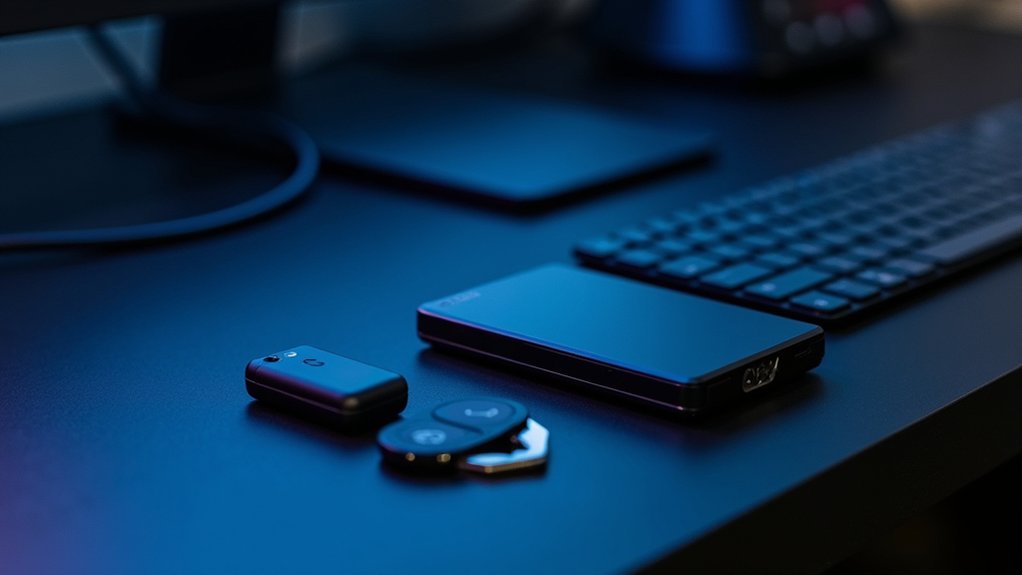Hardware wallets compatible with Kaspa aren’t optional—they’re a necessity, unless you’re willing to gamble your wealth on flimsy software. Ledger supports Kaspa via KasVault, Tangem boasts early adoption with durable, NFC-enabled cards, and OneKey offers open-source security, while Trezor lags, predictably useless. Don’t be reckless; verify compatibility before squandering cash on junk. Kaspa’s high-throughput transactions demand ironclad protection, not naive trust in shady web wallets. Stick around for deeper insights.

The volatile world of cryptocurrency demands unyielding security, yet many Kaspa enthusiasts naively entrust their assets to flimsy software solutions, oblivious to the lurking threats of hacks and scams. This isn’t mere carelessness; it’s a reckless gamble with hard-earned wealth, ignoring the fortress-like protection hardware wallets offer by keeping private keys offline. Kaspa, a proof-of-work cryptocurrency launched in 2021 with its lightning-fast blockDAG structure, deserves better than the digital equivalent of a paper lockbox. Why flirt with disaster when superior options exist?
Cryptocurrency’s wild swings demand ironclad security. Why risk Kaspa on flimsy software when hardware wallets offer fortress-like protection for your wealth?
Ledger, for instance, joined the Kaspa fray in January 2024, supporting devices like Nano S+, Nano X, Stax, and Flex—though, irritatingly, the aging Nano S is being phased out, so don’t dawdle on upgrades. Their Kaspa integration, managed via the third-party KasVault web app since Ledger Live lags behind, isn’t seamless, but it’s a damn sight safer than any browser-based nonsense. Users must install the Kaspa app through Ledger Live, a minor hassle for ironclad security. Setting up a proper Kaspa wallet involves following step-by-step guides to ensure maximum security and functionality. Stop pretending software wallets are “good enough”—they’re not. Kaspa’s design, leveraging the GHOSTDAG protocol, ensures rapid consensus and scalability, making it ideal for secure, high-throughput transactions with hardware protection.
Tangem, the first to officially support Kaspa in April 2023, offers card-shaped wallets with NFC connectivity and EAL6+ certified chips, a middle finger to online threats. Their backup system, using additional cards instead of just seed phrases, mocks the outdated reliance on scribbled words—though, fine, a seed phrase option exists for traditionalists. With support for over 1,000 cryptocurrencies, Tangem isn’t playing small. Additionally, Tangem’s design ensures exceptional durability, surviving extreme conditions like washing machines or harsh temperatures. Meanwhile, OneKey, adding Kaspa in May a2023, boasts open-source models like Classic and Pro, some with Bluetooth and top-tier security chips, even flaunting a Kaspa-branded limited edition. Smirk if you must, but branding aside, it’s a solid choice.
Other contenders, like Cool Wallet (expected August 2024) and SafePal X1, expand the field, while Trezor—shockingly—still snubs Kaspa as of early 2025. Verify support before buying, lest you waste money on incompatible junk. Hardware wallets aren’t optional; they’re a necessity for anyone serious about safeguarding Kaspa. Stop rolling the dice with web wallets downloaded from shady sources. Secure your assets, or regret it bitterly. The choice is glaringly obvious.
Frequently Asked Questions
What Is Kaspa’s Unique Blockchain Technology?
Kaspa’s unique blockchain technology features a BlockDAG architecture, diverging from linear blockchains. Utilizing the GhostDAG protocol, it enables parallel block creation, enhancing scalability, security, and decentralization while achieving rapid transaction confirmations.
How Does Kaspa Ensure Transaction Security?
Kaspa guarantees transaction security through its GhostDAG protocol, a Proof-of-Work consensus mechanism, and the kHeavyHash algorithm. This combination, alongside a decentralized network, protects transactions by maintaining robust security and preventing attacks effectively.
Why Choose Kaspa Over Other Cryptocurrencies?
Kaspa stands out among cryptocurrencies due to its BlockDAG architecture, enabling unparalleled transaction speed and scalability. Its GHOSTDAG protocol enhances security and efficiency, while low fees and instant confirmations make it highly practical for users.
Can Kaspa Be Mined With Regular Hardware?
Regarding whether Kaspa can be mined with regular hardware, it is technically possible using CPUs or GPUs. However, it is generally unprofitable due to high electricity costs outweighing the mining rewards obtained.
Where Can I Buy Kaspa Coins?
Kaspa coins can be purchased on centralized exchanges like MEXC, Bybit, and KuCoin, or through decentralized exchanges such as OKX DEX. Direct purchase options include the Kaspa website via Topper and swap services.









